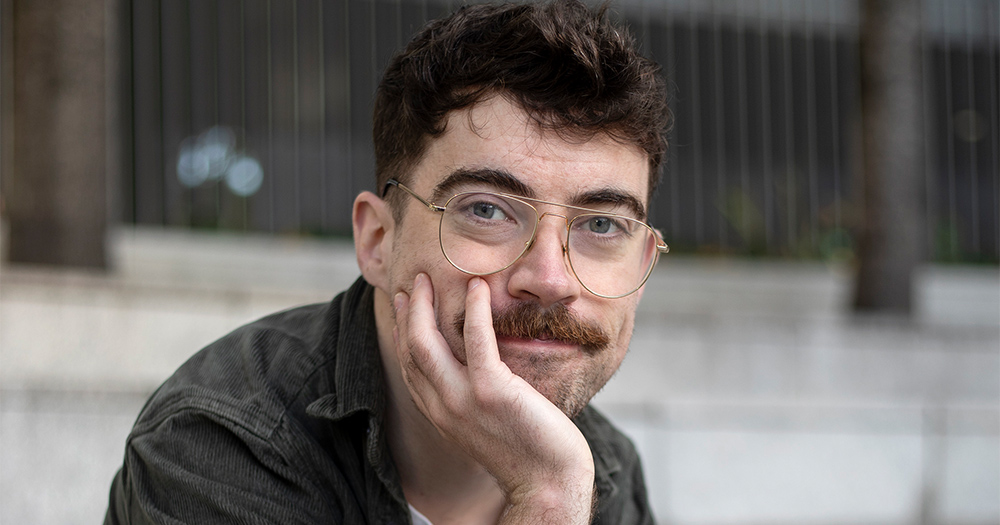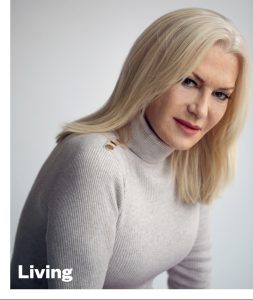My name is Adrian Colwell. I’m 33, an arts administrator and I live in Dublin. I run the life drawing class Drag and Draw and have an intense fear of mice. I have a disability. I watch A LOT of Frasier and am a big fan of Monica Lewinsky.
The above is pretty similar to any dating profile description that I’ve written. ‘Regular’ stuff, peppered with life-long hereditary conditions. Including the latter in my bio is something I’ve always felt a bit conflicted about. It’s impossible for me to write about anything to do with disability (including this article) without thinking about how it will be received by a non-disabled audience. Whether rightly or wrongly, most disability narratives featured on mainstream platforms are constructed with this audience in mind.
A few weeks ago, after discussing what I was planning to write about for this piece, a non-disabled friend advised me to ditch the idea and write about how I masturbate (my disability affects my hands and arms). That, I was told, would be something different, more “sexy” and interesting to a general audience than what I had planned.
Granted, whilst a larger discussion around the desexualisation of people with disabilities may be a mega rich one, I wasn’t arsed in writing something solely to be “interesting” to non-disabled people in a ‘how do I do what you do?’ sort of way; people with disabilities have to answer those types of questions enough as it is. I wanted instead to do something about perception, something that might even be relatable to people outside of the disability community.

It is important to acknowledge that no individual disabled person speaks for the whole community; a community which is so diverse and varied. For example, I experience certain types of privilege daily being white, Irish and a cisgendered male. These aspects of my life make things a lot easier for me and greatly influence my experience of having a disability. In addition, at this stage of my life, my physical disability does not affect me much practically (though maybe one day it will). But, my body is still different, still othered and requires a label and explanation for most people.
I have a disability for the most part because I am (initially at least) seen that way. The medical model of disability is very different from the social one, where people can be disabled solely by their environments or interactions or perceptions.
Navigating the perception of physical disability (specifically in a dating context) is very relevant to my personal experience in my life thus far.
Much like how I was advised what to write about for this article, I have also gotten some unsolicited advice on how to write my dating bios and whether to mention disability or not. Some tell me to remove it, that “it shouldn’t matter” and in any case I’m not “disabled enough” to use that label. Others say that I should be more detailed, that the word ‘disability’ alone might make people think that I’m “more disabled” than I am. Both problematic pieces of advice – let’s face it. Just mentioning the word ‘disability’ can conjure up lots of complicated notions for people that I’ll never be able to fully identify or challenge. As well as this, not mentioning it at all can feel deceitful or that I’m ashamed in some way.
As such, these dating bios for me can be a bit of a minefield whether I mention it or not, it can provoke some very interesting reactions.
Whilst it’s a nice thought that disability shouldn’t matter, it does – at least in the context of understanding. If disability doesn’t matter to you in a dating context, this attitude goes beyond just saying that in a Tinder message. In my experience, attitudes towards disability aren’t usually openly declared, largely because lots of people don’t know what they think about it, they haven’t had the opportunity or need. This is not unexpected; very few people have any understanding of unfamiliar life experiences until they are faced with them. It’s important though to realise that these attitudes can reveal themselves through people’s comfort levels, their tact and their treatment of others who fall outside of the norm in some way.
I’ve to remind myself to check myself on that. I’m pretty socially intelligent but there’s no way I could fully understand forms of oppression or otherness I don’t experience. I gotta be aware of that and also aware of the ways that any lack of understanding can emerge. Much like other minority groups, there are complexities related to the disability experience (specifically when it comes to dating) which mightn’t be obvious even to people who consider themselves “woke”.
Sensitivity is one thing but attraction is another.
Challenging your concepts of what you deem attractive and sexy is not easy. We all have ideas about what we like and fancy – myself included – and these are strongly influenced not only by our own personal experiences but also more universal ones. Whether we like it or not, the western beauty standards that we are all affected by are geared towards specific face types, skin types, body types, etc. It takes a certain type of mindset to supersede these influences – if you want to supersede them at all. These influences are nowhere more prevalent than in the ‘swipey swipey chatty chatty’ online dating scene -a scene that’s notoriously based on how you look and present yourself.
However, although it is a fickle environment, there is a safety to it. From the person who called me a “retarded cunt” when I didn’t respond to them to the person who told me I was lucky that I had “a good face” to the person who had no interest in me but wanted to set me up with his disabled friend, I get all sorts of dodgy comments that I am not hugely bothered by because of the distance that being online brings. And the block button.
You can prepare people, prepare yourself and consider your responses. Offline, however, you have to deal with everything in real time.
Moving from the apps to real life brings with it a whole new situation to navigate and a whole new idea of attractiveness to explore. Yes, you can explain everything to the nth degree via text, you can FaceTime and show someone every inch of you, but when you’re fumbling to hold a wine glass with no stem (I hate those) or figuring out the best way of holding hands, things get a lot more real. Whilst all of this can be a bit of a headache, there are positive aspects of not being able to hide or filter anything IRL. It can identify people who might have the right combination of open-mindedness, respect and sensitivity.
Granted, I do sometimes wonder if some of these people on initial first dates are just nice, considerate, ‘woke’ people as opposed to anyone interested in a longterm love connection, but either way, that open-mindedness can create a space for vulnerability, honesty and connection which is very seductive and hard to come by. I’ve also found it creates an opportunity for a much more nuanced and exciting conversation regarding sex; not straightforward nor solely focused on salacious stuff (like how I masturbate) but more to do with creativity and communication.
In fact, most times, when I talk about my physical differences to a date, they also open up about something that they struggle with which perhaps isn’t visible; depression, loss, family issues, employment issues, sexual issues. We all have something that we wonder how other people will react.
Inevitably, worrying about how you’re seen can extend to worrying about who you’re seen with. Much like how “different” bodies need to make sense to people through their own personal lens, so do “different” relationships.
There is the belief that everyone needs to make sense; be cast in the correct role and that the behind the scenes stuff – things like safety, stimulation, sexual compatibility – are non-factors. You just need to make sense visually to others. This is where comparisons come into it. I’ve been guilty of thinking this way myself, not engaging in dates by comparing myself to them and wondering if the visual pairing would provoke some dodgy comments.
I’ve been told in the past that some of my dates were “a mismatch”, wouldn’t have been “someone I would put you with” or that the pairing was a “weird” one – all based on visuals. It may have been unintentional, but for me, it’s impossible to dissociate these comments from disability.
Non-disabled people in a relationship with a disabled person are perhaps seen as saintly figures who must tolerate a lot, implying that they must be an amazing person and not an asshole. Conversely, these relationships can often be treated with suspicion where the disabled person is perhaps seen as vulnerable or being taken advantage of – implying that they must be an amazing person and not an asshole. Both are obviously untrue. People make assumptions all the time based on very little (as someone with a disability, I can definitely be an asshole sometimes).
But these sort of comments can end up affecting the people in the relationship to the point where they themselves believe in and echo what they hear. If someone thinks your partner or date is too good for you, that’s one thing, if your partner or date thinks it, that’s another. If the call is coming from inside the house – you might be in danger.
There are so many topics relevant to this subject that I wanted to talk about, and that I simply can’t address in one article. Do time and familiarity in relationships really dissolve any perceived differences? Are people with disabilities more inclined to think long term as opposed to being spontaneous? How does disability affect ideas of masculinity or femininity? Do we all create easy reasons why we are “undateable” as opposed to exploring more difficult ones (to reiterate -I can be an asshole sometimes)? Again, these are probably more relevant to me and not representative of anyone else’s experience.
If I were to emphasise one thing that I would like the reader (and I suppose the writer) to take away from this, it’s how limiting perception can be. Any form of otherness is heavily based on perception and presumptions rather than actual realities. We all like to understand (both ourselves and other people), but we all have growth opportunities in this regard (myself included). It’s important to challenge our preconceptions as much as possible as, ultimately, you could be limiting yourself from having lovely experiences and connections, romantic or otherwise. A reluctance to do this might be the real disabling factor.
This article originally appeared in GCN Issue 369 which you can read in full here.
© 2021 GCN (Gay Community News). All rights reserved.
This article was published in the print edition Issue No. 369 (December 3, 2021). Click here to read it now.
Support GCN
GCN is a free, vital resource for Ireland’s LGBTQ+ community since 1988.
GCN is a trading name of National LGBT Federation CLG, a registered charity - Charity Number: 20034580.
GCN relies on the generous support of the community and allies to sustain the crucial work that we do. Producing GCN is costly, and, in an industry which has been hugely impacted by rising costs, we need your support to help sustain and grow this vital resource.
Supporting GCN for as little as €1.99 per month will help us continue our work as Ireland’s free, independent LGBTQ+ media.

